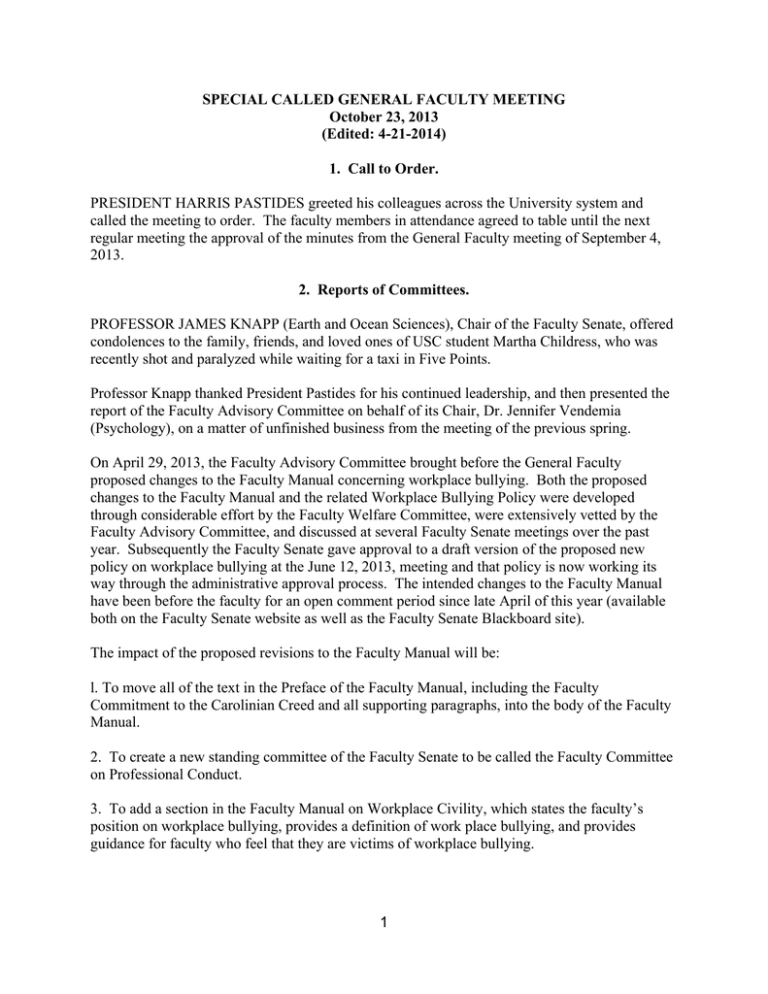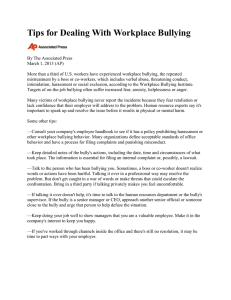PRESIDENT HARRIS PASTIDES greeted his colleagues across the University system... called the meeting to order. The faculty members in... SPECIAL CALLED GENERAL FACULTY MEETING
advertisement

SPECIAL CALLED GENERAL FACULTY MEETING October 23, 2013 (Edited: 4-21-2014) 1. Call to Order. PRESIDENT HARRIS PASTIDES greeted his colleagues across the University system and called the meeting to order. The faculty members in attendance agreed to table until the next regular meeting the approval of the minutes from the General Faculty meeting of September 4, 2013. 2. Reports of Committees. PROFESSOR JAMES KNAPP (Earth and Ocean Sciences), Chair of the Faculty Senate, offered condolences to the family, friends, and loved ones of USC student Martha Childress, who was recently shot and paralyzed while waiting for a taxi in Five Points. Professor Knapp thanked President Pastides for his continued leadership, and then presented the report of the Faculty Advisory Committee on behalf of its Chair, Dr. Jennifer Vendemia (Psychology), on a matter of unfinished business from the meeting of the previous spring. On April 29, 2013, the Faculty Advisory Committee brought before the General Faculty proposed changes to the Faculty Manual concerning workplace bullying. Both the proposed changes to the Faculty Manual and the related Workplace Bullying Policy were developed through considerable effort by the Faculty Welfare Committee, were extensively vetted by the Faculty Advisory Committee, and discussed at several Faculty Senate meetings over the past year. Subsequently the Faculty Senate gave approval to a draft version of the proposed new policy on workplace bullying at the June 12, 2013, meeting and that policy is now working its way through the administrative approval process. The intended changes to the Faculty Manual have been before the faculty for an open comment period since late April of this year (available both on the Faculty Senate website as well as the Faculty Senate Blackboard site). The impact of the proposed revisions to the Faculty Manual will be: l. To move all of the text in the Preface of the Faculty Manual, including the Faculty Commitment to the Carolinian Creed and all supporting paragraphs, into the body of the Faculty Manual. 2. To create a new standing committee of the Faculty Senate to be called the Faculty Committee on Professional Conduct. 3. To add a section in the Faculty Manual on Workplace Civility, which states the faculty’s position on workplace bullying, provides a definition of work place bullying, and provides guidance for faculty who feel that they are victims of workplace bullying. 1 Much of the rest of the policy lies in the policy document, intentionally, as that may more readily be changed than revisions to the Faculty Manual. The only proposed amendments to the document since it was last presented relates to the definition of bullying. These are amendments which were proposed by the Office of General Counsel for the University, which has extensively reviewed the proposed policy and the Faculty Manual changes, and these two specific changes are to include in the definition of bullying the designation of “severe and pervasive” behavior. In addition, there is a proposed change the wording “Faculty who feel” to “Faculty who believe” that they are victims of workplace bullying. Regarding the inclusion of the “severe and pervasive” language, the Office of General Counsel felt that similar language is used in other legal contexts and would help avoid frivolous claims of bullying under this new policy. The Advisory Committee deferred to the judgment the General Counsel Office, although there is some sense that could also be a deterrent to people rightfully pursuing a complaint of bullying. These are the only two changes resulting from the essentially six-month comment period. Otherwise the document remains unchanged from where it was last April. PRESIDENT PASTIDES invited discussion, comments, and questions for Professor Knapp. PROFESSOR CHARLES MACTUTUS (Psychology) asked for a point of information about the way the committee is structured. The language provides that there are ten members to be elected across a revolving three-year term. The second paragraph seems to state that when a complaint occurs, the Provost is going to select a subcommittee of three people who are specially trained to handle investigations of complaints, and then two faculty members who are not trained. What is the rationale for that? PROFESSOR ERIN CONNOLLY (Biological Sciences), current Chair of the Faculty Advisory Committee, noted that the policy has been revised in order to provide that all members of the Committee on Professional Conduct will receive all of the training. PROFESSOR KNAPP explained that this revision is one of the suggestions that came from the Legal Counsel Office. Professor Knapp noted that the policy itself is not being presented for a vote today, just the changes to the Faculty Manual to provide for the existence of the policy. PROFESSOR DAVID MOTT (Medicine), past Chair of the Faculty Advisory Committee, also addressed the issue of the involvement of two faculty members who are appointed by the Provost who are not on the committee. These individuals will receive training. The idea of having two people who are not on the committee is to give the Provost a little more flexibility if there are multiple complaints coming forward at the same time. Multiple, simultaneous complaints could become overly burdensome for the committee members if the five members of an investigative team had to come from the sitting committee. If there were three complaints, members would be serving on multiple committees; the appointed members allow for a little more flexibility. 2 PROFESSOR SUZANNE MCDERMOTT (Medicine) asked for clarification regarding the differentiation between matters to be handled by the Committee on Professional Conduct and those to be handled by the Grievance Committee per the Faculty Manual. PROFESSOR KNAPP confirmed that issues involving workplace bullying would go through the Committee on Professional Conduct. He added that one might imagine that if somebody were either found guilty of workplace bullying or somebody wasn’t they might pursue the grievance process through the Grievance Committee subsequently as a result of that action. PROFESSOR MOTT further explained that a faculty member who was through this process of adjudication of a workplace bullying complaint found guilty, that faculty member could go through Grievance, as could any faculty who has a legitimate grievance complaint as outlined in the Faculty Manual. The Grievance Committee would be open arbiter of an appeal. The initial investigation of a bullying complaint would go through the Committee on Professional Conduct, not through Grievance. If a person feels as though s/he is a victim of workplace bullying and the complaint was adjudicated and was found to be without merit, then the faculty member could appeal to the Provost, not to the Grievance Committee. If somebody was found guilty of bullying and was sanctioned, then the faculty member could appeal through the Grievance Committee. PROFESSOR MACTUTUS asked for clarification on the question of whether the policy applied to faculty members who begin serving in temporary or permanent administrative positions. Are administrators immune to complaints of bullying? PROFESSOR KNAPP stated that, as he understood the interpretation of the policy by the Faculty Welfare Committee, occupation of an administrative position does not exonerate a person from a faculty-on-faculty bullying relationship. PROFESSOR MIRIAM JOHNSON (Social Work) noted that the policy document does not contain specific information about what type of sanctions might come into play if a faculty member were found guilty of workplace bullying, or who would impose the sanctions. PROFESSOR KNAPP explained that it is important to distinguish between the proposed changes to the Faculty Manual and the Workplace Bullying Policy itself. The policy is in essence affected by a combination of the Faculty Civility Advocate and the Provost’s Office. There are a variety of sanctions that might be implemented as a result of a determination that somebody had engaged in workplace bullying but that information is contained in the policy and not in the Faculty Manual Changes. PROFESSOR KNAPP added a further clarification. The policy now puts in place a mechanism whereby there is the ability to deal with workplace bullying but the impact of approving the Faculty Manual changes is what insures that we as faculty maintain a role in that process. The policy will now go forward through administrative channels for final approval but these changes to the Faculty Manual and the creation of this new committee will insure that the faculty continues to play a role in that process, rather than deferring to the administration to handle those cases. The implementation of the changes to the Faculty Manual puts the faculty front and 3 center in essentially the disciplining of our own membership rather than deferring it to the administration. PRESIDENT PASTIDES called for a vote to accept the proposed revisions to the USC Faculty Manual regarding workplace bullying. The proposed revisions were accepted as amended. PRESIDENT PASTIDES shared information with the faculty about the recent shooting incident in Five Points that left an 18-year-old USC freshman Martha Childress paralyzed. The President noted that it has been a very difficult week since that despicable incident of violence. A truly innocent young lady was waiting for a taxi when she was struck by a random bullet fired by a criminal. President Pastides and other representatives of the University visited with her and her family on the day after, and the President was thankful to find a very strong and resilient family. Martha is anxious to start her rehabilitation and return to class, and her younger brother is highly committed to enrolling in the University of South Carolina. The President spoke of an almost miraculous turnaround where University representatives visited the family to offer comfort and support from the University community and found themselves uplifted beyond imagination. Martha has been transferred to Atlanta to the Shepherds Center where she will receive intensive therapy. We were fortunate that there was a very good surgeon on call, in fact the chairperson of our USC Department of Surgery, who was able to do wonderful things and to save her life. President Pastides has been relatively outspoken about the safety concerns related to the Five Points district. He noted that the area is a vibrant and diverse environment that, unfortunately, attracts a criminal element late at night due to the probability of vulnerable potential victims in possession of resources that are attractive to criminals. The President stated that he will be pushing for making Five Points a pedestrian zone, at least late at night on weekends so that there would be less density, less crowding, less bumping into each other, less pickpocketing opportunities on the sidewalks and also less opportunity for pedestrian accidents with vehicles. That idea has not been met with uniform approval. Others are recommending wristband approaches to acknowledge people who are truly there to spend money and have a good time. President Pastides observed that there many, many other ideas but the one that he is encouraged about is the coming together of three law enforcement agencies during the intervening days – the Columbia Police Department, the Richland County Sheriff’s Department, and the University of South Carolina Division of Law Enforcement and Safety. They are working on an operational plan that would be in place this weekend and would continue to improve over time relative to more people on patrol and different kinds of patrols. The approach will be very sensitive to the civil liberties of people who are not University students, but the primary agenda has to be safety. Thursday night there will be a big on-campus alcohol-free party in Martha’s honor and the President expects that there will be thousands of people there. We will be looking at a much wider array of alcohol-free campus events that would involve concerts and free food behind the Strom and on recreational fields and indoors when the weather is colder. We will look at the possibility of mounted police possibly down in Five Points as an added opportunity to conduct 4 better surveillance. President Pastides noted that we are well served by the people who have come together on Martha’s behalf and on all of our behalf in law enforcement, in facilities, and in transportation. The University is looking into restoring free shuttle service to and from Five Points. Students are worried whether they will be cited and or arrested for boarding the shuttle if they are inebriated. There are all sorts of variables involved as we go forward to address safety concerns. A large degree of student sentiment is that the police aren’t looking for criminals as much as they are looking to catch underage drinkers. There are many complexities here relative to that and related issues. The President noted, as well, that beyond the human tragedy - which is by far the most compelling – the safety issue in Five Points is also a risk management issue for the University. We don’t know yet whether high school students will factor this into their decision about whether to apply and/or whether to attend the University. For many reasons we’ll be looking at increasing safety, and the President invited suggestions and advice from faculty members on the issues. 3. Adjournment. A motion to adjourn was seconded and passed. 5




